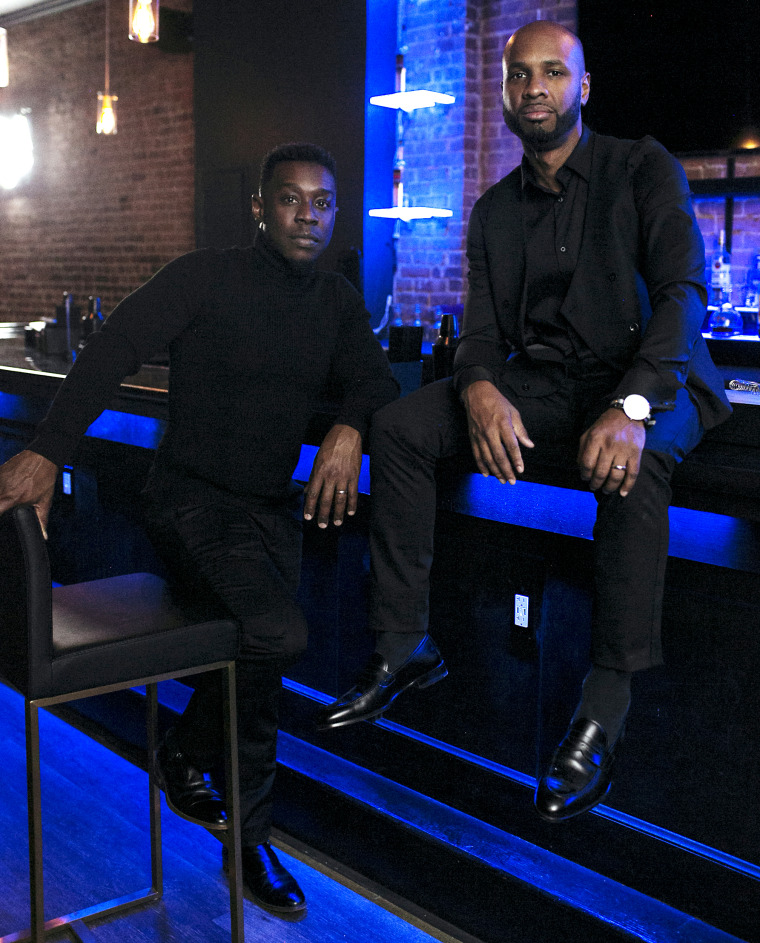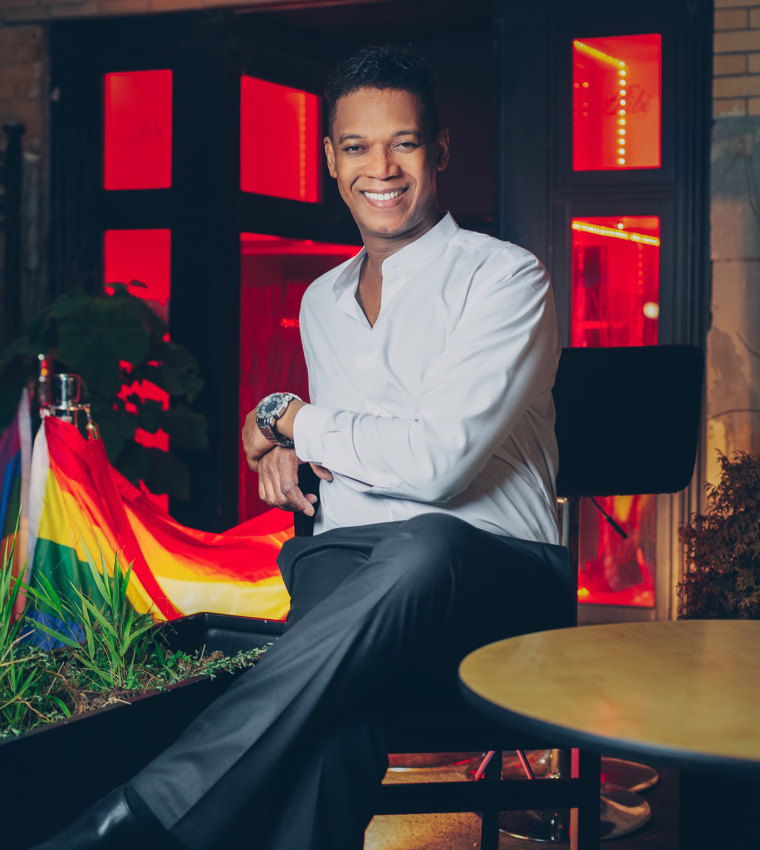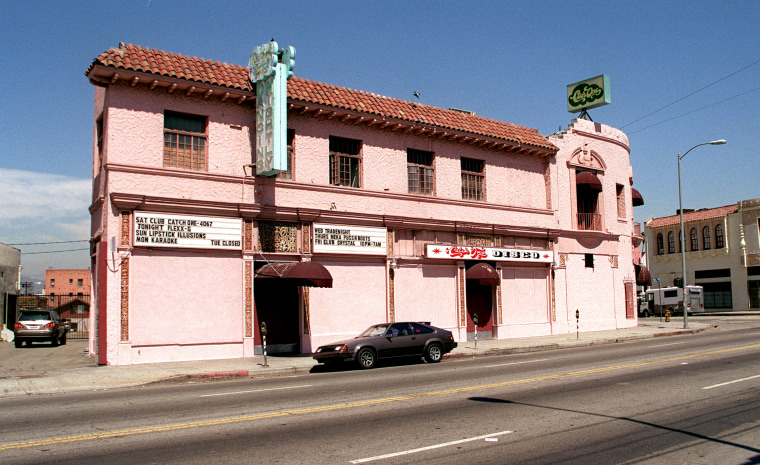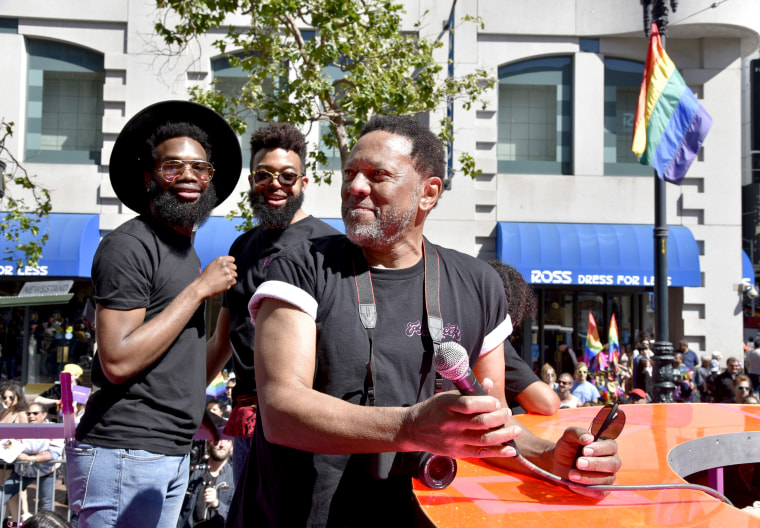Black-owned Gay Bars Are Dwindling. Can they Survive Covid?
When Charles Hughes and Richard Solomon began making plans in 2018 to open their own gay bar in New York’s historic Harlem neighborhood, they had no idea a pandemic would shut them down before they even opened.
“The first thing we thought was, ‘Oh, my gosh, we’re going to be out of business before we started this business,’” Hughes, 39, told NBC News.
But a global health crisis is not the only headwind their bar, Lambda Lounge, and the few remaining Black-owned gay bars in the United States are facing. Long before anyone had heard of Covid-19, these LGBTQ social spaces were dwindling across the country.

For more than two decades, gay bars, especially those owned by people of color, have been disappearing. Historically, these spaces were where the LGBTQ community gathered to find romance, make long-lasting friendships and engage in community activism. Throughout the 1980s, there were more than 1,500 such bars, a number that has declined steeply since the late ‘90s, with fewer than 1,000 existing today, according to a study published last year by Oberlin College and Conservatory professor Greggor Mattson.
The closures have had a disproportionate impact on bars catering to women and people of color: Between 2007 and 2019, LGBTQ bar listings dropped by an estimated 37 percent, and those serving people of color plummeted by almost 60 percent, according to the study. Though the reasons are not entirely clear, experts suspect the overall decline in gay bars is related to decades of skyrocketing rents and gentrification, which have disproportionately impacted small, Black-owned businesses; the emergence of online dating sites and apps; and circuit parties that rotate among venues, which have become increasingly popular among younger crowds.
According to online listings, there are more than 60 LGBTQ bars across the five boroughs of New York City, one of the metropolitan areas hardest hit by the pandemic, and many of these spaces are struggling to stay open. Of the city’s dozens of remaining gay bars, just two — Lambda Lounge and Alibi Lounge, both in Harlem — are known to be Black owned. Club Langston in Brooklyn closed last year after nearly two decades in business.
Since it opened in 2015, Alibi Lounge has become a sanctuary for LGBTQ people of color. In March, under city mandates, owner Alexi Minko was forced to temporarily shutter his bar and soon began to run out of money. A former lawyer who had poured his life savings into his business, Minko frantically applied for emergency aid through the government’s overwhelmed Paycheck Protection Program application, whose website he said continuously crashed.

Desperate for assistance, Minko reluctantly set up an online fundraising campaign for his bar. He was on the brink of ending his lease, he said, when donations suddenly surged. In only a matter of weeks, the campaign raised $165,000. While Minko eventually received a small loan through the government’s emergency relief program, he said the donations “absolutely saved my business,” as well as the idea that it’s possible for a Black gay man to open his own bar.
“My fear if Alibi had gone down is to instill in the young mind that, ‘Oh, why bother? We’re Black and gay, it’s just going to fail anyway,’” said Minko, who has since reopened his bar outside at limited capacity in compliance with New York City’s rules.
Earlier this month, Alibi Lounge was one of 10 LGBTQ-owned businesses to be awarded funding through the Queer to Stayprogram, a small business initiative from Showtime and the Human Rights Campaign, a national LGBTQ advocacy group.
Access to ‘mainstream capital’
While the total economic fallout from the pandemic won’t be known for some time, August data from the business listing site Yelp found that more than 2,800 businesses had permanently closed since March in New York City alone, and a report published last month from the Partnership for New York City, a nonprofit business group, said as many as a third of the city’s “230,000 small businesses that populate neighborhood commercial corridors may never reopen.”
The national picture is also grim, especially for Black business owners: A report released in August by the Federal Reserve Bank of New York found the number of Black-owned businesses declined more than 40 percent across the U.S. between February and April, while white-owned businesses declined 17 percent.
In June, the Small Business Administration released a list of 661,218 organizations that received loans of $150,000 or more. It received racial and ethnic backgrounds from just 94,501 owners. Of those, 1,827 Black-owned businesses received loans.
Related
The pandemic is hitting Black LGBTQ Americans hard. This study shows how badly.
Most of these business owners rely on personal finance and credit, and often lack relationships with banks, according to Cy Richardson, senior vice president for economics and housing programs at the National Urban League, a nonprofit that advocates for economic and social justice for Black Americans.
“Broadly, the notion of access to mainstream capital, that’s where the racial wealth gap is really exacerbated,” he said.
Those at the intersection of the Black and the LGBTQ communities have been particularly hit hard amid the pandemic, according to asurvey released last month by the Human Rights Campaign, which found Black LGBTQ respondents fared worse than both the overall Black population and the overall LGBTQ population along every economic indicator measured.
‘Envy of the wider gay community’
Scholars who study LGBTQ nightlife say the loss of Black-owned gay bars would be devastating. Historically, these bars have been havens for people of color, who have experienced discrimination in white-owned bars for generations, according to Eric Gonzaba, an assistant professor of American Studies at California State University, Fullerton, who is writing a book about the history of gay nightlife.
Around the 1960s, gay bars began to sprout in metropolitan areas across the U.S. At the time, closeted white people didn’t want to be seen entering a gay bar where someone they knew might recognize them, so owners had a tendency to open these bars in predominantly Black neighborhoods. They would then often enact racist policies — including unfair carding measures and dress codes — to keep Black people out, according to Gonzaba, who said even up until the 1990s, some white bar owners would require people of color to show three forms of government picture ID to enter.
Related
Few lesbian bars remain in the U.S. Will they survive COVID-19?
“These are places that were highly segregated for much of their history and are perfect examples of the inability for the LGBTQ rights movement to have a unified coalition into the ‘70s and ‘80s,” Gonzaba explained. He said even the Stonewall Inn, the once mafia-owned New York City gay bar that has become a symbol of the LGBTQ rights movement, “didn’t let a lot of people of color into the doors” (it has long since operated under new owners who do not engage in such discrimination). Since many gay bars in the ‘80s and ‘90s were where gay activists gathered to educate the community about HIV and AIDS, he said lifesaving information about the virus often didn’t reach the Black community.
Fed up, the Black LGBTQ community began to form its own house parties and unique social clubs in cities with large Black populations. Washington, D.C., alone boasted about 20 bars, nightclubs, coffeehouses and social gatherings that catered to a Black LGBTQ clientele, according to the Rainbow History Project, though it’s unclear if all were Black-owned and operated. Black gay activist groups used these spaces to educate patrons about HIV and AIDs and to organize around issues for racial justice. Perhaps the most epic among them, the The Club House, remained a popular D.C. haunt until it shuttered in 1990.
Related
Trans icon Marsha P. Johnson to be honored with statue in N.J. hometown
Unlike most LGBTQ bars at the time, Black-owned bars welcomed a gender diverse crowd, including transgender and gender-nonconforming people, according to Gonzaba. He said these patrons cultivated a unique music subculture in the 1970s composed of early disco and drag, and a “more sexually expressive culture” began to flourish.
“This is music that’s founded by African American and Latinx people in inner cities, parts of Chicago and Philadelphia and Washington, and dancing becomes normalized … and this kind of style of music and this kind of style of dancing that’s highly sexualized becomes the envy of the wider gay community,” Gonzaba said of this early disco era that would later give rise to house and electronic dance music.
“It’s the ability for clubs to be places of refuge and sexual expression and sexual exploration,” he said, that still lead people today to “think of bars and nightlife as a place to not just have a drink but to explore different avenues of one’s sexuality, and that’s hugely borrowed from Black culture.”
Where are all the Black-owned gay bars?
The number of Black-owned gay bars, currently and historically, is unknown, since there is no resource that specifically tracks them, and Gonzaba said many bars frequented by LGBTQ people of color have historically been white-owned. But business listings suggest there may not be many of them left.
In addition to Lambda Lounge and Alibi Lounge in New York, at least three others — Jeffery Pub in Chicago, Metro 2.0 in Jackson, Mississippi, and Jocks PHL in Philadelphia — are still in business.https://www.instagram.com/p/BzWSKlLBq7l/embed/captioned/?cr=1&v=8&wp=1116&rd=https%3A%2F%2Fwww.nbcnews.com&rp=%2Ffeature%2Fnbc-out%2Fblack-owned-gay-bars-are-dwindling-can-they-survive-covid-n1241100#%7B%22ci%22%3A0%2C%22os%22%3A877%2C%22ls%22%3A852%2C%22le%22%3A873%7D
In Chicago, the pandemic is threatening to shut down what might be the country’s oldest Black-owned gay bar. Jeffery Pub opened in the 1960s and has gone through multiple owners, according to the current owner, Jamal Junior. The businessman, who purchased the bar in the mid-2000s, was forced to temporarily close the pub in March under a city ordinance as the pandemic swept through the Midwest. He said the pub has not been able to reopen in compliance with city mandates because it lacks outdoor space.
“I’m just praying and hoping that we can survive,” Junior, 46, told NBC News.
Metro 2.0 owner Temica Morton is currently trying to hold on to what might be the only Black-owned gay bar in the South. Morton, a Jackson-based LGBTQ advocate, acquired the lease to the bar in February just as the pandemic struck the U.S. She invested her entire savings into Metro 2.0, which she said has been a popular venue for LGBTQ people of color of all genders since it opened in the late 1990s. But a seesawing series of shutdown orders from state and city officials left the businesswoman in “panic mode” as she struggled to figure out how to keep the bar alive. The bar temporarily shut down Aug. 5, and reopened in September at limited capacity after the shutdown lifted. Morton, 44, said she’s now “taking it one day at a time.”

Many Black-owned bars whose clientele was composed largely of people of color have shuttered in the past decade, including several in New York City alone, like Starlite Lounge, No Parking and Club Langston. Perhaps the most famous of the shuttered bars was Jewel’s Catch One, a Los Angeles venue known for its Black disco scene that operated between 1973 and 2015 under the ownership of lesbian Jewel Thais-Williams. And a decade before that, the community lost beloved bar Knob Hill in Washington, D.C., which operated between 1957 and 2004.
In 1990, after dealing with decades of discrimination at gay bars in San Francisco, where he moved in 1969, Rodney Barnette, a Vietnam War veteran, former member of the Black Panther Party and gay rights activist, opened his own bar. The New Eagle Creek Saloon, which operated under the slogan “A friendly place with a funky base for every race,” was forced to shut down after only three years due to rent increases that Barnette said he could not afford. But before it shuttered, he said the saloon served as a refuge for San Francisco’s LGBTQ people of color. Activist groups like Lesbians and Gays of African Descent for Democratic Action (LAGADDA) gathered there to organize against racist carding policies in San Francisco and to educate the Black community about HIV prevention, he said.

“I call it a community center that served alcohol, that’s the way I describe it,” said Barnette, whose bar has been memorialized by his daughter, artist Sadie Barnette, in an exhibit commissioned by The Lab in San Francisco.
“People felt good,” he said of the saloon’s patrons. “You could walk in the bar, and know there wouldn’t be any discrimination against you, that you were welcome, that everybody was welcome.”
‘Everybody should be treated equal’
By the 1990s, Black LGBTQ activists and allies had successfully fought to end racist carding policies. However, a number of recent incidents indicate that racism still plagues gay nightlife.
In 2016, fury erupted in Philadelphia after a video shared widely on social media showed the owner of a popular gay bar using the N-word. A 2017 report issued by the city’s Commission on Human Rights found that women, minorities and transgender people felt unwelcome and unsafe in Philadelphia’s gay neighborhood for decades. The report recommended establishments and organizations in the so-called gayborhood undergo training for racial bias and hire more diverse staff.
In 2018, a group of Atlanta drag performers, all trans women of color, collectively quit their jobs at a popular gay club, Burkhart’s, after its white owner made racist posts on his Facebook page.
Related
16 queer black pioneers who made history
Last year, an email from a manager at Progress Bar, a gay bar in Chicago’s “gayborhood,” ordered DJs to stop playing rap music at the bar. “Anything vulgar, aggressive or considered mumble rap (including certain Cardi B tracks and newer Nicki Minaj) is off limits,” the manager wrote in a leaked message.
In June, activists gathered in front of 941 Saloon, a Pittsburgh gay bar, to protest dress codes they said discriminated against Black people.
In July, a picture circulating on Facebook showed a bartender at Number Nine, a popular gay bar in Washington, D.C., apparently wearing a “black face” Covid-19 mask. The management later posted an apology, claiming the bartender didn’t know the mask was racist.
Over the years, as wealth in the U.S. has become more concentrated, Gonzaba said it is not uncommon for multiple gay bars to be managed under a single owner.
“These bars are owned by wealthy, white men who often have many different establishments in the cities,” he explained.
Related
Teacher set to be N.Y.’s first Black gay state senator
Some bars, even if they don’t engage in discriminatory practices within their establishment, try to cultivate loyalty among white clientele through their branding, according to Gonzaba. For example, in 2012, a leaked email from a gay bar owner in Washington, D.C., revealed that he had requested an advertisement for the bar, which displayed a Black man, be replaced with “a hot white guy,” stating it was “more our clientele.”
Barnette, who now resides in Los Angeles, said that despite progress made by activists, LGBTQ nightlife still caters predominantly to white men.
“The overall gay white male community has not reformed into making it a point that everybody should be treated equal,” he said.
‘A responsibility to queer people of color’
In New York City, where Covid-19 cases have plummeted, bars and restaurants have been allowed to slowly reopen outdoors at limited capacity. Starting Sept. 30, restaurants will be allowed to reopen their indoor space at 25 percent capacity, though bar service will not be permitted.
In July, Lambda Lounge celebrated its grand opening with a “nice turnout” despite restrictions, according to Hughes and Solomon, 38, who set up their lounge outdoors.
“It was so nice,” Hughes said. “We had to literally stop people coming in so we could be compliant with Covid rules.”
While the couple said they did receive a small loan through the emergency relief program, they are unsure how long they will remain open without more assistance, especially as the weather cools and a possible second wave of Covid-19 could force the city to shut down bars and restaurants later this year. So far, they’ve raised nearly $6,000 through a GoFundMe campaign for their lounge.
Hughes said the ongoing stress is giving him migraines, and Solomon said it has been “hard to find optimism right now.” Their insurance premium has already increased by $1,000 a month due to the pandemic, they said, and they are not currently bringing in enough money to cover their rent and other expenses. Still, the men vow to stay open as long as they can.
“We have a responsibility to queer people of color to make sure that this place lasts, and it’s extremely difficult when we run into obstacles,” Solomon said, “but the glass is half full.”